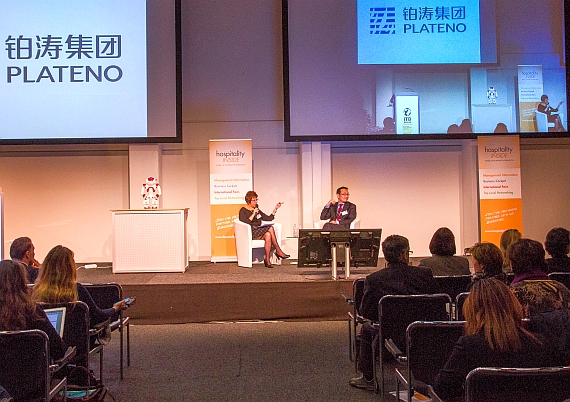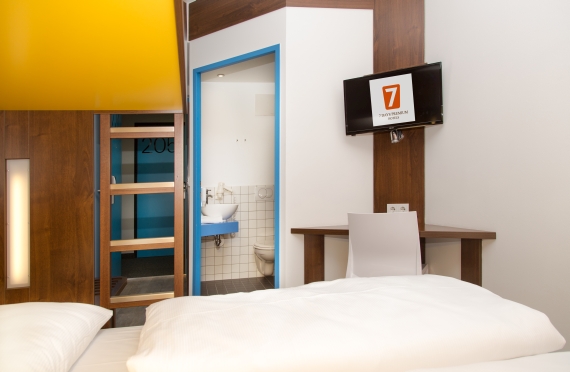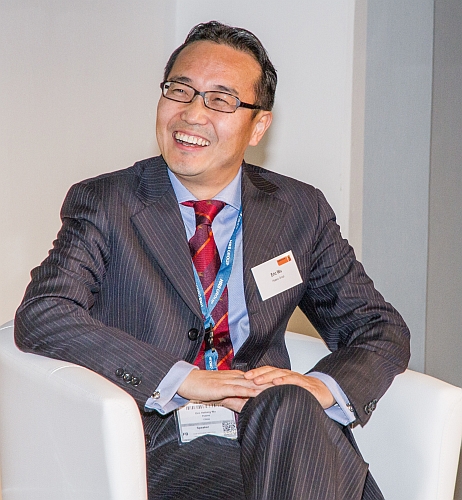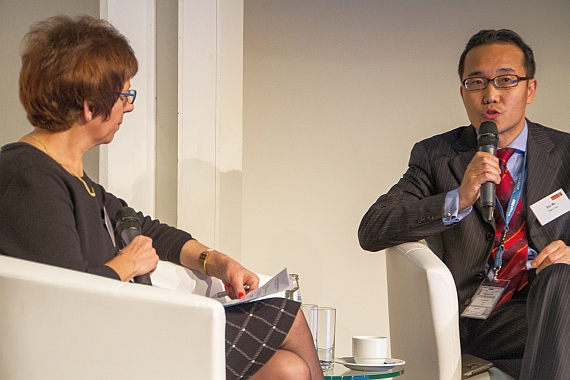ITB Hospitality Day 2016: Plateno CFO Eric Wu about the hotel giant from China
|
|
|
| Eric Wu talking to Maria Puetz-Willems at the ITB Hospitality Day 2016: For the first time, a Chinese hotel group is up on stage elaborating on its thoughts and plans in a face-to-face interview. |
Berlin (April 8, 2016). The Chinese Plateno Group is already operating the first hotel of its brand 7 Days Inn in Ansfelden near Linz in Austria; the hotel in Puch near Salzburg is to open in April. The group wants to enter Europe only selectively; however, partnerships are desired – in both geographical directions. In China, the market leader has obtained more power through the participation of Jin Jiang, and the loyalty programme and WeChat have become influential tools for customer loyalty. The figures are staggering. At the hotel conference, the "ITB Hospitality Day", Plateno's Executive Director and Chief Financial Officer Eric Wu explained in a discussion with hospitalityInside's Editor-in-chief, Maria Puetz-Willems, the strategy of the Chinese hotel giant and the background for its rapid expansion course.
The Plateno Group is currently present with about 2,500 hotels in nine countries; and with 500 to 600 hotels in its pipeline, the group already counts more than 3,000 properties. According to Erich Wu, it is not a very big challenge to open 500 hotels a year. For two and a half years now, Plateno has been operating outside of China and opened an office in Berlin one year ago. In Africa, Plateno has a joint venture with a group from South Africa and will open an office in Nairobi. In the focus of expansion outside of China currently are Indonesia, Malaysia, Austria, France (Paris), Kenya and Germany.
In 2005, Plateno developed via the brand 7 Days Inn in China. "This name was chosen as the number 7 is easy to remember", said Wu. The number of hotels of this brand increased rapidly, and after four years, the group already counted 300 properties and prepared its initial public offering in New York. In 2013, it was privatised again; up to this point, 7 Days Inn was the only brand. Gradually, Plateno founded additional brands, also in the midscale and upscale segments and acted as operator of international brands such as Hampton by Hilton or Barcelo; in addition, it entered a partnership with the Austrian H12 group in 2014 and currently with the German Ameron brand.
Plateno's portfolio incorporates about 18 brands and the largest number of the hotels is positioned in the budget segment. The cooperation with Ameron is more than a mere master franchise agreement, said Wu. Plateno supports Ameron in its market development in Asia but also helps to define the brand anew. "Ameron is a German product and we want to maintain its quality in China," said Wu. In China, Plateno has its own academy for the education of experts; however, this is a large task overseas. Therefore, the cooperation or partnership with hotel schools in Switzerland is of top priority on the business' to-do list. For the cooperation with international brands, their hotels are adapted to the respective markets, generally speaking.
 |
|
| Plateno counts 18 brands, most of them in the budget segment. The group just opened its first property in Europe. The audience listens attentively. |
Loyalty programme
as bed filler
Wu, who studied in the US and worked for PriceWaterhouseCoopers afterwards, joined Plateno in 2007. Back then, the group had 80 hotels and was the largest hotel group in China, according to CEO Alex Zheng. For its expansion, the profound knowledge of the group's CEO and his management concerning digitalisation was a great help. Prior to the founding of 7 Days Inn, Zheng worked for the Chinese OTA Ctrip. Therefore, the hotel group intently dealt with the improvement of its own booking channels and its loyalty programme already in 2005/06. "From the beginning, the loyalty programme has been our core responsibility," said Wu. In addition, the group benefits from the internet passion of the Chinese. Today, Plateno's loyalty programme has more than 80 million members and is – in a comparison – larger than Marriott's programme with 54 million members, for example.
From the beginning, the admission barriers for Plateno's loyalty programme were low and the benefits were tempting. When booking for the first time, people are already able to register for free and thus collect points, obtain discounts and profit from services such as late check-out (as senior member), for example.
Every lobby has a computer where all arriving guests are able to join the programme immediately. "These computers are still available, but the admission is normally done via smartphone app, as every Chinese owns a smartphone today," said Wu. WeChat has become the most important tool here. "It is similar to WhatsApp but has many more functions and becomes increasingly important as it has become so popular," explained Wu. Today, WeChat has 600 million users in China. You are able to book via WeChat, have direct contact with businesses; it covers everything the internet has to offer.
WeChat as channel for everything
40 percent of the bookings at Plateno's own channel are generated via WeChat today. "10 million followers have signed our WeChat account," said Wu. 60 percent of the other direct bookings are done via internet. "The online market is the most important market in tourism," according to the manager. The business is constantly trying to make the booking processes as consumer-friendly as possible. Today, they are very comfortable and easier than the booking processes via OTAs. Around 75 percent of the bookings at Plateno happen via its own channels, but mainly online. Of the remaining 25 percent, 11 percent are generated by OTAs, the rest are walk-ins and local customers. "Our call centre is available more for complaints and questions, but not for reservations."
 |
|
| First impression of the first Euruopean Plateno Hotel in Linz, Austria: The 7 Days Premium brand is a hotel typ in the 3 to 4-star segment offering 2-star rates. |
In China, the OTA's commission is 15 percent on average, according to Wu. Important brokers in China are Ctrip, Qunar and eLong. At Ctrip, 80 percent of the bookings are already taking place via mobile channels; the business already controls 80 to 90 percent of the OTA market. Indeed, the Chinese equivalent of Google, Baidu, tried to conquer the market but Ctrip is still dominating and has even acquired shares of Baidu in the meantime. "We are close partners of Ctrip and purchased eLong and Expedia in a joint move in China. In the meantime, Plateno also introduced the loyalty programme Plateno Travel, which includes additional travel services: "It could replace our current loyalty programme as it includes more than just one hotel," said Wu. Moreover, the programme could generate revenues for other businesses and generate money this way.
More than 69 percent of the members of Plateno's loyalty programme are between 18 and 32 years old. "When we launch a new brand in the economy to midscale segment, we address young people in our marketing campaigns," explained Wu. One and a half years ago, the "iu" brand was introduced, which has more than 100 hotels today. "iu" is an internet hotel, it offers the fastest Wi-Fi connection in the region. The subject of rate parity is a problem for individual hotels or smaller chains, which have problems fighting against it, said Wu. "With our own distribution channels we are in a better position, for sure."
Entering Europe with rates starting at 60 euros
Inspired by the success in its home market, Plateno is currently working on the introduction of its own brands in Europe. 7 Days Premium is taking the first step; it is a hotel type in the 3 to 4-star segment for the rate of 2 stars. Under this brand, a hotel has already been opened in Linz (takeover of a hotel in a mixed complex close to the autobahn), which already had an occupancy of 100 percent in February, according to Wu. In addition, there are Plateno projects in Salzburg, as already mentioned (within an industrial park), as well as in Frankfurt and Berlin.
Other brands, which should be strengthened are ZMax (a young, modern and fun W in the middle class segment, according to Wu), iu and James Joyce Coffeetel. As drinking coffee has become very popular in Asia and all young people are walking around with Starbucks mugs in their hands, a hotel has been developed for coffee drinkers. These examples emphasise Plateno's creativity in the creation and marketing of added value for its guests. In the founding phase of 7 Days Inn, when the hot water supply in China did not work smoothly everywhere, the company advertised that the showers would provide hot water within 10 seconds, for example. "We promoted many things, which became industry standards later on," explained Wu, who liked to provide the trade professionals with some facts and data about the economic concept of 7 Days Inn.
In Shanghai, the average room rate is 200 to 280 yuan, which is about 30 to 40 euros. In Europe, the brand starts with entry level rates of 60 euros. For the brands in the lower segment, there is no revenue management but rather stable rates, contrary to the brands of the upscale segment. A typical 7 Days Inn room has 16 to 17 square metres including the bathroom; a hotel has 100 rooms on average. The total area including public areas has 3,000 square metres. They do not provide full-service restaurants but free internet and TV. A hotel of that size has 16 to 17 employees including housekeeping, according to Wu. "Based on our own IT system, we developed a hotel operating system, which is more efficient than that of others," Wu said. One of the focuses here is the reduction of overhead costs.
 |
|
| Eric Wu: In China, the market is permanently changing. |
Selective in Europe, partners wanted
About the expansion strategy outside of Asia, Wu said: "We do not want to enter every European country. The European and the Chinese markets are very different." And there are great differences within Europe, as is widely known. Therefore, the focus is on Central Europe, Austria, Germany, Poland, and the Czech Republic. Plateno also likes to enter into partnerships when expanding in foreign countries. "When we find a good local partner in Europe, then we cooperate with this partner," explained Wu. Also emerging destinations or B locations are interesting, older hotels as well as new buildings. They want to remain flexible and integrate the owners' judgements in their decisions.
"We are happy about an open dialogue. Partnerships have to provide added value to both partners," said Wu. For the five existing projects in Europe, they have signed lease agreements; owing property is not planned in Europe and China. In China, they like to sign management agreements for new hotels, but about 500 lease agreements still exist by virtue of their history.
Reversely, European hotel chains appreciate the cooperation with Plateno in China due to the great differences of the markets. Asked about the largest differences between China and Europe, Wu said: "So far, I have been to Europe about five times and I do not know the market well. But generally speaking, the European hotel market – including the German market – is very well developed. There are clear rules and a large data basis. Therefore, the yields are easy to calculate" In China, the market is constantly changing. "We had hotels with 95 and 100 percent occupancy there; in the meantime, occupancy levels are off at partly 80 percent," said Wu and added: "The customers in Europe know exactly what they want. In China, the hotels have to be brought to the attention of the customers."
Even more power with Jin Jiang
In the interview, Wu also explained the participation of the state-owned hotel giant Jin Jiang from Shanghai at Plateno. In September 2015, Jin Jiang took over 81 percent of Plateno. In 2015, Jin Jiang also took over the French Louvre Group and together, they became the world's number 5; soon, it will probably become number 3 in Europe. "Jin Jiang might be state-owned but is very commercially oriented nonetheless," explained Wu. "The company is supported by the state and has better access to capital. Especially in Shanghai and East China, Jin Jiang is very strong."
In addition, the business holds 25 percent of Shanghai Disneyland and manages many high-class hotels in Shanghai, some of which are to join Plateno Hotels. "Together with Jin Jiang, we have completely different power with a total of 6,000 hotels when negotiating with OTAs than if we were on our own," said Wu, naming one advantage of this merger. However, he affirmed that Plateno remains an independent business.
Upon request, Wu commented on the current economic situation: "China is facing economic challenges, but tourism is a growth market with an expected two-digit increase." Within the last one and a half years, the development of cheap hotels has declined a little; Chinese customers are looking for better quality now. Therefore, the 2 and 3-star segment has increased. The Lavande brand, for example, is showing enormous growth. However, China is a big country and the stronger the market the better the development there. Shanghai, for instance, has developed very well in the last two years; the north-eastern part of China, however, shows very weak economic development in some parts. / Susanne Stauss
Watch the video of this ITB Hospitality Day session 2016 here in full length!
Continuative Links:
- March 20, 2015 Success story with hot shower: Chinese Plateno Hotels prepare direct market entrance in Europe
- April 1, 2016 Owning the customer: ITB Hospitality Day makes Google and Booking.com clarify their strategies
To print this article you have to be registered and logged in for newsletter, visitor or subscription.






